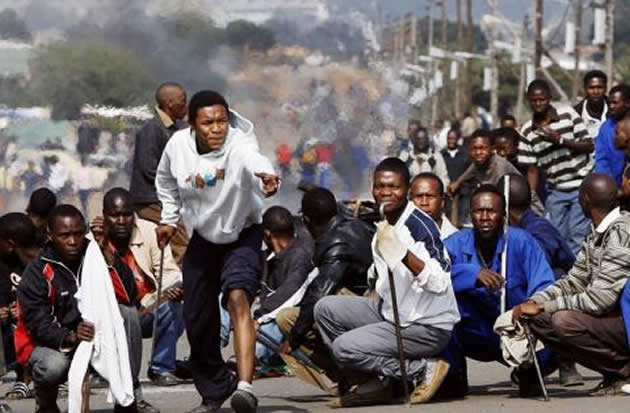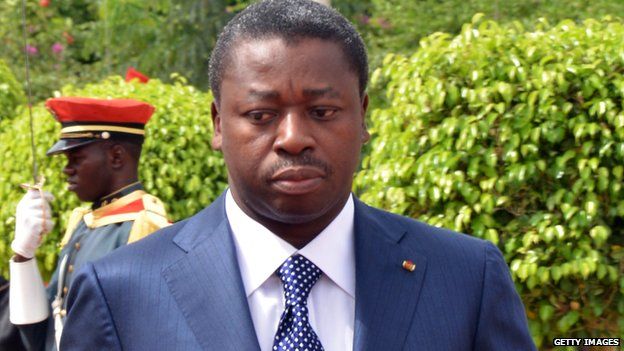Xenophobia: ‘We’ll burn you alive’

JOHANNESBURG — Security has been beefed up at the Durban offices of the South Africa Human Rights Commission (SAHRC) after a series of violent threats, City Press reports. Anonymous callers have threatened to burn down the office if it continued its investigation into Zulu King Goodwill Zwelithini after his alleged anti-foreigner speech in Pongola last month, which is widely believed to have sparked the xenophobic attacks in KwaZulu-Natal three weeks ago.
A source within the SAHRC revealed to City Press one of the threatening remarks: “If you do not immediately stop with the investigation against the king, your office will be burnt with you in it.”
Another was directed at SAHRC staff: “Be careful. We are watching you. And we know where you live.”
SAHRC spokesperson Isaac Mangena confirmed the organisation had received numerous threatening letters and calls that came through to the provincial offices “regarding our investigation into the alleged utterance by His Majesty King Goodwill Zwelithini at the moral regeneration event in Pongola”.
Mangena said the SAHRC was concerned about the threats because many of the organisation’s staff members “work in the communities where some of the calls and letters come from”.
He declined to reveal from which areas the threats were being received.
“The commission is continuing with its investigation into the king’s utterances and will release a report with its finding at the end of the investigation,” he said.
Mangena said the threats, which were being taken seriously, were now being analysed to see how much danger they posed to the commission and its staff.
He said the commission believed that Zwelithini had no role in the threats and said that the king’s office had been cooperating with the SAHRC’s investigation.
“Whether there is a threat or not, we don’t believe that the king has anything to do with that.”
City Press has obtained a copy of the National Joint Operational and Intelligence Structure report, which reveals a 27-step programme to address xenophobia and immigration-related problems in South Africa.
The plan is a mix of tough action against foreigners who are in South Africa illegally, and action against those perpetrating the violence.
It includes the re-registration of all foreigners who have been displaced by the recent violence and who are now staying in refugee camps, and the repatriation of those found to be in the country illegally. The department of home affairs will also begin to trace and monitor foreign nationals. All who enter and leave the country will have to submit biometric information such as fingerprints.
In addition, all government departments will support the programme to reintegrate legal migrants into the communities they fled.
The plan also details daily troop deployments to hot spots, and a massive deployment of intelligence agents to develop a xenophobia early warning system.
The South African Police Service, prosecutors and intelligence departments will work together on a case management system with dedicated courts, prosecutors and interpreters to expedite cases. National police spokesperson Lieutenant General Solomon Makgale said 330 people had already been arrested in Gauteng, KwaZulu-Natal and North West in connection with the attacks. Specialised courts, which already have close to 50 cases before them, had been set up in Chatsworth, Durban and Umlazi, said KwaZulu-Natal director of public prosecutions Moipone Noko.
Meanwhile, top South African government officials are furious about the Nigerian Senate’s public reprimand following the xenophobic attacks.
“We restrained ourselves when they had the bodies of our citizens who were killed there,” said a senior official who declined to be named, referring to the 84 South Africans who died when a building collapsed at Pastor TB Joshua’s Synagogue Church of All Nations last year. We had grounds to make a scene, but we didn’t,” he said.
On Thursday, Nigeria’s Senate asked the government to immediately recall its ambassador from South Africa and to take Zwelithini to the International Criminal Court. One senator also called for South Africa’s suspension from the African Union (AU). The AU’s next summit is set to be hosted in Johannesburg in June.
On Monday, Nigeria’s foreign ministry summoned South Africa’s high commissioner to Nigeria, Lulu Mnguni, “to register Nigeria’s protest over the ongoing xenophobic attacks”.
While one Pretoria official described the summons as a “hostile act”, Nigeria’s acting high commissioner to South Africa, Martin Cobham, told City Press yesterday that “it is normal for a government to ask you to come for clarification or a briefing on events as they unfold”.
Economic Freedom Fighters leader Julius Malema on Saturday visited the Isipingo refugee camp in Durban, where he distributed mattresses and bedding. He promised to force government to act against xenophobia. “You are not stealing anybody’s jobs. There are no jobs in South Africa,” he said.
Social Development Minister Bathabile Dlamini caused a stir when she arrived and complained to police about Malema’s presence in the camp. Despite her protestations, police escorted her on a walkabout while Malema spoke. She was booed by the crowd of refugees.
Daniel Dunia, one of 350 Congolese in the Isipingo camp, said he was concerned about what would happen when the camp was closed because not much had been done about reintegrating him and his countrymen into the communities they came from.
“We have lost our houses and our businesses. Where can we go? There has to be a plan first, otherwise we will be sleeping under a bridge,” he said.
Authorities said the Phoenix camp in Durban, housing refugees from the north of the city, would be emptied and closed this week. There is no end in sight for the Chatsworth camp, which still houses almost 3,000 people, as mainly Malawian refugees continue to arrive in their hundreds daily. Some are looking for a ride home and others fear new outbreaks of violence.
Meanwhile, Nigeria recalled its ambassador to South Africa on Saturday in the latest sign of African countries’ discontent at Pretoria’s handling of attacks on immigrants.
Acting High Commissioner Martin Cobham and Deputy High Commissioner Uche Ajulu-Okeke had been asked to return to Nigeria for consultations, a statement by the foreign affairs ministry said.
“The invitation is in connection with the on-going xenophobia in South Africa targeting foreigners, mainly African migrants,” the statement said.
Earlier this week Nigeria summoned South Africa’s high commissioner over the unrest as protesters picketed the South African embassy in Lagos.
A Nigerian group has called for the International Criminal Court to investigate Zwelithini for “hate speech”. South Africa has deployed troops to try to quell the violence, after criticism by nations including China and Zimbabwe for failing to protect their citizens against armed mobs.
South African firms such as mobile phone giant MTN and supermarket chain Shoprite have significant interests in Nigeria, which is Africa’s biggest economy. — AFP











Comments